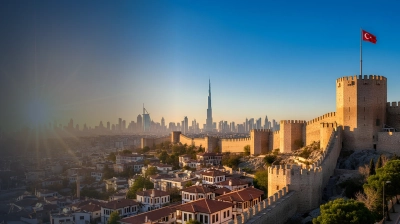The United States and the United Kingdom have long been among the most popular destinations
for real estate investors. Investors have traditionally directed their capital toward growing cities
and countries due to the prospect of high returns. London, New York, and Miami can be
considered the most globally prestigious among these destinations. These cities have attracted
significant domestic and international real estate investment thanks to their expanding
commerce and growing populations. Such investments not only increased the total capital
inflow into these markets but also provided substantial rental income. However, in recent years,
newly emerging cities and countries have surpassed these once-iconic investment hubs. Istanbul
and Dubai have become particularly attractive to investors, drawing a large share of real estate
capital. While Dubai has achieved greater success in this regard, Istanbul has continued to break
records as one of the most visited cities in the world. Similarly, Dubai has ranked just below
Istanbul in terms of global tourism. As real estate hotspots, both cities have delivered significant
profits to investors, although Dubai has begun to stand out more prominently in terms of future
expectations.
There is a strong correlation between housing prices and economic growth. Real estate prices
tend to rise in parallel with national economic expansion. For instance, during the 2020–2025
period, Turkey doubled its economy in dollar terms, while housing prices in Istanbul rose by
76%. In contrast, Dubai saw a greater increase in housing prices than in its economic growth,
offering higher profits to investors.
Another important factor affecting housing prices is global inflation. One of the key
expectations of investors is that their investments generate returns that outpace inflation.
Between 2020 and 2025, global inflation in dollar terms reached approximately 40%, causing
many investors to experience a loss in the real value of their financial assets. Similarly, a further
24% inflation is expected for the 2026–2030 period. If the returns on investments fail to keep
up with these inflation rates, there is significant potential for investors to incur losses.
When viewed from the above-mentioned perspective, the trends in real estate investment in
cities like Istanbul, Miami, London, and Dubai become more meaningful. During the 2020–
2025 period, Istanbul appears to have provided the highest returns for property investors,
while investors in London experienced losses. It is also evident that real estate investments in
Miami, Dubai, and Istanbul offered protection against global inflation.
When looking at property value appreciation across cities for the 2026–2030 period, Dubai
clearly stands out, offering investors a high potential for profit. According to forecasts by
international institutions, Istanbul, London, and Miami are not expected to generate returns that
outperform global inflation during this period. While there are several reasons why Dubai is
considered more attractive for investment compared to other cities, the primary factor is the
city's rapid growth. With the population projected to reach 8 million by 2033, Dubai is attracting
high-income groups. The city’s recognition continues to rise, supported by over 20 million
annual tourists and $30 billion in tourism revenue. Additionally, Dubai’s exemption from
income tax gives it a significant advantage over its competitors. Based on these dynamics, we
as Parcel Estates see strong potential in the city and look forward to supporting those who invest
in Dubai.
© Copyright by Parcel Estates







